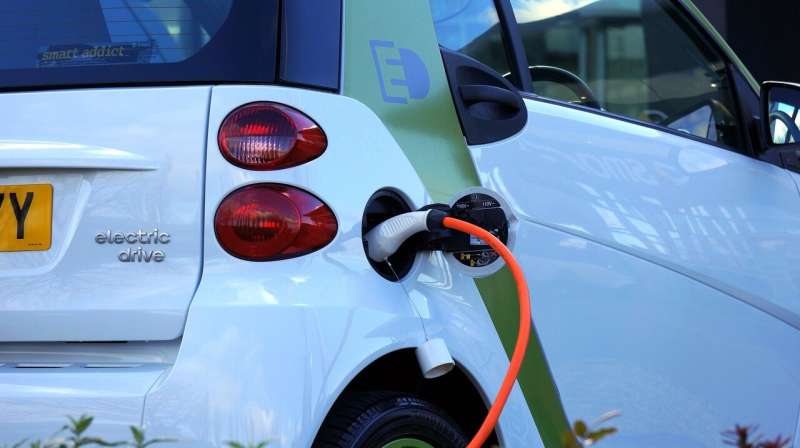This article has been reviewed according to Science X's editorial process and policies. Editors have highlighted the following attributes while ensuring the content's credibility:
fact-checked
peer-reviewed publication
trusted source
proofread
Study shows electric vehicles can have positive impact on air quality and public health in some cities, but not all

What do Houston, Los Angeles, New York and Chicago have in common? The answer is dense population, high traffic volume and air quality that fails to meet ozone standards set by the U.S. Environmental Protection Agency. Those circumstances made each city a prime candidate for a University of Houston study assessing the impact of vehicle electrification on air quality and public health.
Titled "Air quality and health co-benefits of vehicle electrification and emission controls in the most populated United States urban hubs: insights from New York, Los Angeles, Chicago and Houston," the study looked at changes in air pollution, specifically PM2.5 and ozone levels in these major U.S. cities under different electrification scenarios. The work was published in the journal Science of the Total Environment.
The study found that by switching to electric vehicles, Houston could prevent 157 premature deaths each month, while New York and Chicago could see even greater benefits—avoiding 796 and 328 premature deaths per month, respectively. In Los Angeles, a scenario with a 29% EV share for light-duty vehicles could save 104 lives each month, but full electrification could increase mortality in Los Angeles due to higher PM2.5 and ozone levels.
"Our findings indicate vehicle electrification generally contributes to reducing greenhouse gas emissions, improving air quality, and lowering the mortality rate associated with exposure to toxic air pollutants," said the first author of the paper Ali Mousavinezhad, who earned a Ph.D. from the Department of Earth and Atmospheric Sciences of UH's College of Natural Sciences and Mathematics this year.
"However, due to the complex atmospheric chemistry and unique meteorological and geographical conditions of Los Angeles, complete electrification might lead to increased concentrations of secondary aerosols, potentially causing adverse impacts on human health and the economy by raising mortality rates," he added. "This underscores the need for region-specific environmental regulations."
In the full electrification (FullE) scenario, PM2.5 levels—tiny particles that can harm our lungs—dropped by up to 2.29 μg/m3 in many areas. Surprisingly, parts of eastern Los Angeles saw PM2.5 levels rise by up to 0.67 μg/m3. This was due to an increase in secondary organic aerosols, caused by changes in nitrogen oxides and volatile organic compounds dynamics, and a spike in hydroxyl radical concentrations.
The unique weather and geography in and around Los Angeles, including a mountain range to the east, can trap air pollutants in downwind areas. This can lead to higher concentrations of pollution.
The study also found significant reductions in nitrogen oxides and maximum daily average 8-hour ozone levels in the FullE scenario, with drops to 14.00-32.34 parts per billion and 2.58-9.58 ppb, respectively. However, some areas experienced increases in MDA8 ozone, highlighting the complexity of air quality management.
Economically, the FullE scenario promises significant health-related savings, ranging from $51 million to $249 million per day for New York, Chicago, and Houston. Conversely, Los Angeles could face economic losses up to $18 million per day.
"The four largest U.S. cities have distinct anthropogenic sources of air pollutants and greenhouse gases," said Yunsoo Choi, corresponding author and professor of atmospheric chemistry, AI deep learning, air quality modeling and satellite remote sensing. "Each city requires unique regulations or strategies, including different scenarios for the adoption of electric vehicles, to reduce concentrations of these pollutants and greenhouse gases effectively."
The overall impact on air quality is a more complex undertaking than many realize. Estimating future scenarios related to electric vehicles and changes in other sources—such as industry, residential areas, biogenic emissions, oceanic emissions, and others—contribute to this complexity.
However, both Choi and Ali see a lot of opportunity in the current push for electrification of the transportation sector.
"In the future, we anticipate an increase in the number of electric vehicles on the road, which will help reduce the emissions of air pollutants and greenhouse gases from vehicle tailpipes. By considering the expected percentage of electric vehicles in the future, we can estimate the impact of these changes on air pollutant and greenhouse gas concentrations, which ultimately affect human health," Choi said.
This study shows that there is no one-size-fits-all solution. Effective and nuanced air quality management is crucial to a cleaner, healthier world.
"The findings of this study will assist policymakers in tailoring their regulations to the specific characteristics of different regions to enhance quality of life," Ali said.
As America and the world move towards a greener future with electric vehicles, these findings underscore the need for a balanced and thoughtful approach to ensure both environmental and public health benefits are fully realized.
More information: Seyedali Mousavinezhad et al, Air quality and health co-benefits of vehicle electrification and emission controls in the most populated United States urban hubs: Insights from New York, Los Angeles, Chicago, and Houston, Science of The Total Environment (2023). DOI: 10.1016/j.scitotenv.2023.169577
Journal information: Science of the Total Environment
Provided by University of Houston




















